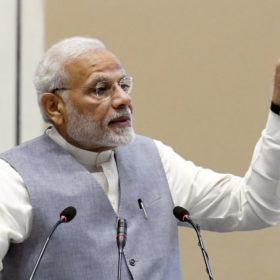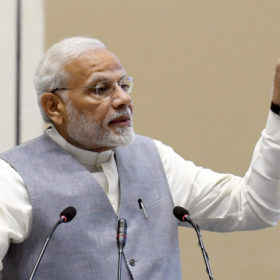PM Modi stresses on setting up vertically integrated solar supply chain

Setting up a complete ecosystem from silicon ingot to solar module manufacturing will help the country generate employment and provide various other advantages, said the prime minister in a review of the work done by the Ministry of New and Renewable Energy.
Prime Minister Narendra Modi has stressed on developing a complete ecosystem for manufacturing of solar equipment in the country.
The PM was chairing a meeting to review the Ministry of Power and Ministry of New and Renewable Energy’s work.
Modi said developing the ecosystem for manufacturing ingots, wafers, solar cells and modules in India would help the country generate employment and various other advantages.
In the agriculture sector, the Prime Minister emphasized the need to adopt a holistic approach for the entire supply chain ranging from solar water pumps to decentralized solar powered cold storage.
He also pitched for an innovative model for rooftop solar. “Each State should have at least one city (either a capital city or any renowned tourist destination) entirely powered by rooftop solar systems,” he said.
Complete solarisation of Konark sun temple and Konark town in Odisha is one such initiative by the MNRE. The goal is to meet all the energy requirements of Konark town with solar energy. The project will be funded with 100% central financial assistance (CFA) of around Rs 25 crore through MNRE.
The Prime Minister also directed the officials to expedite the plan for carbon-neutral Ladakh and emphasized on [cleaned] drinking water supply in coastal areas by harnessing the solar and wind energy.
State-specific solutions
In the meeting, policy initiatives including revised Tariff Policy and the Electricity (Amendment) Bill 2020 to redress the problems afflicting the power sector were also discussed.
Prime Minister Modi emphasized the need to enhance consumer satisfaction while increasing operational efficiency and improving the power sector’s financial sustainability.
He pointed out that the power sector problems, especially of the electricity distribution segment, vary across regions and states. Instead of looking for a one-size-fits-all solution, the Ministry should place state-specific solutions to incentivize each State to improve its performance.
Modi also asked the Ministry of Power to ensure that the Discoms publish their performance parameters periodically so that the people know how their Discoms fare in comparison to their peers. He also emphasized that equipment usages in the power sector be made in India.


